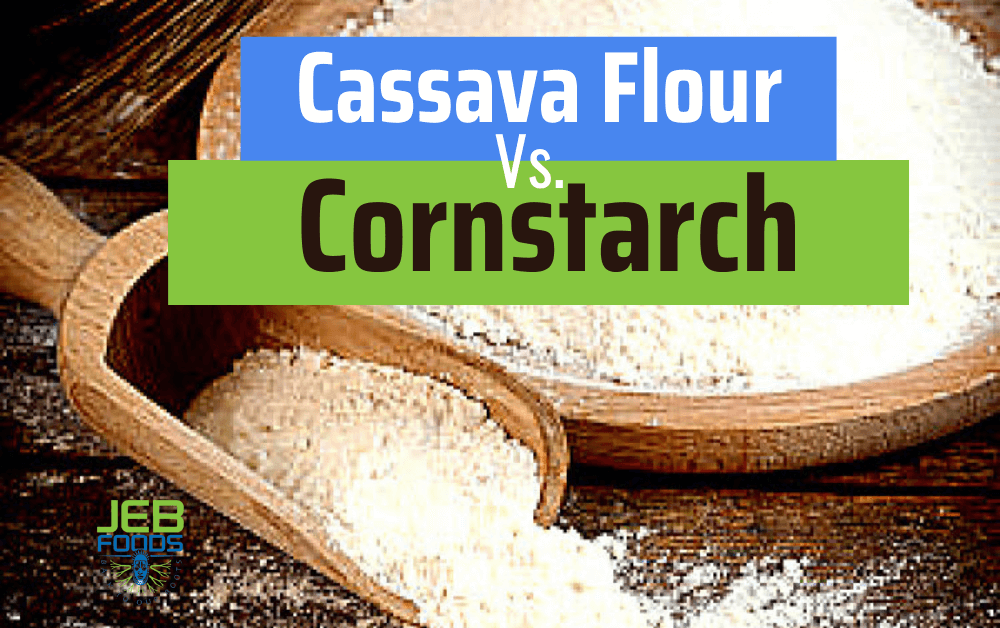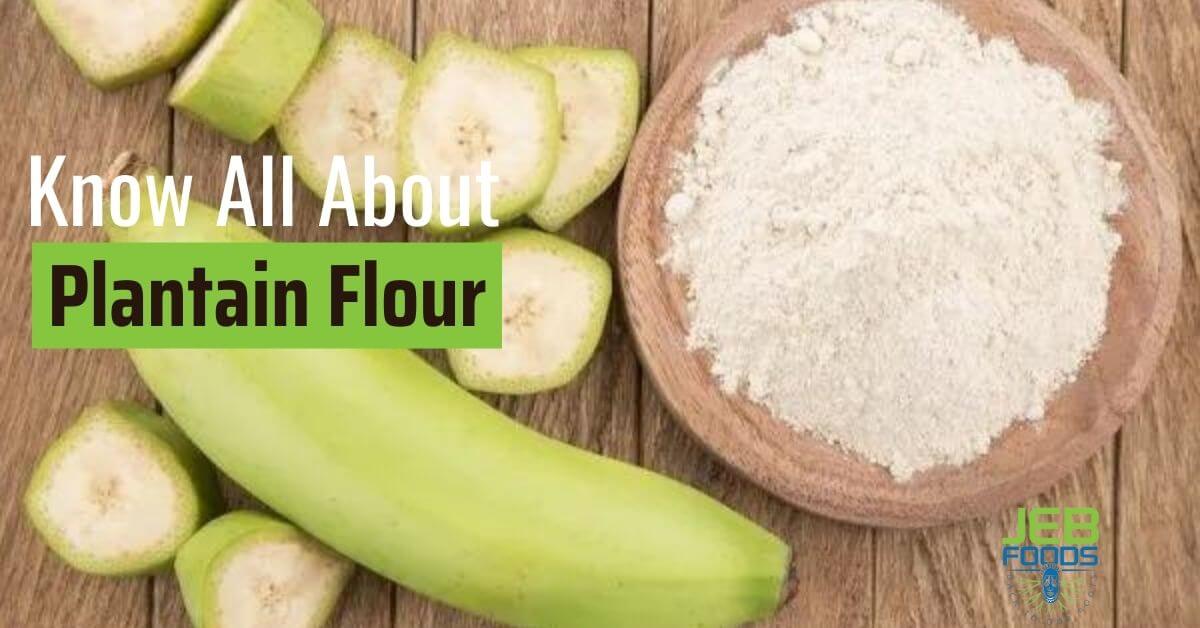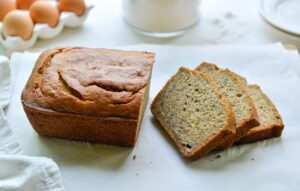I am an advocate of gluten-free flour, and both cassava and cornstarch are gluten-free. But there is a massive difference between them, which I will be writing about today.
Cornstarch, as you might expect, is derived from corn, but tapioca flour is derived from the cassava plant’s root.
Cassava flour frequently produces a glossy end product, whereas cornstarch produces a more matte appearance. These two may be used interchangeably in most recipes.
See also Cassava flour vs wheat flour
A Brief Overview Of Cassava Flour Vs. Cornstarch
Table of Contents
ToggleCarbohydrates from cassava flour-based foods provide you with the fuel your body requires to do work; they also help strengthen your basic body’s metabolism, such as your heartbeat, breathing, and brain activity, due to added nutrients such as vitamin C.
Corn starch is a white powder obtained from corn on the cob.
In addition, the corn is first placed in a saline solution for several days. It is then finely ground, and the maize flour is passed through a silk fabric.
In this way, the bran and other flour components can be filtered out. Starch is not soluble in water, so it settles at the bottom of the remaining starch-water mixture after a while. The surplus water is then poured off, and the starch is dried.
Similarities Between Cassava Flour And Corn Starch
- They are both gluten-free with high carbohydrate content.
- Also used as a thickening agent in stews, soups, and sauces.
- They both are good for frying, giving a crisp and lovely golden brown color.
- Cassava flour and corn starch are great substitutes for gluten-based thickeners. Cornstarch has high starch contents, cassava flour contains more fiber(giving it its thickening power), making both more nutrient-dense options.
- Corn starch is just one of many forms of starch. The starch powder can be obtained from all plants with high starch content. In addition to corn starch, potato, cassava, and rice starch are widely used.
- They are both valuable in vegan and eggless baking dues to their starchy properties as binders.
Difference Between Cornstarch And Cassava Flour
- Cornstarch is from the kernel of corn, while cassava flour is from ground tubers
- Cornstarch is simply digestible starch, while cassava flour is resistant starch(complex carbohydrate).
- One major difference between the different forms of starch is its composition. Starch is a mixture of two carbohydrates, amylopectin, and amylose. Corn starch is characterized by a comparatively high amylose content of 27 percent. Amylose is less able to bind and hold water than amylopectin.
- The reason why baked goods made with corn starch tend to get stale faster than baked goods made with starch from cassava or potato.
- Cassava flour contains high dietary fiber, while cornstarch is 100% starch.
- Unlike cornstarch, it is recommended to eat cassava as a staple food instead of other grain food during weight loss.
You can enjoy nutritious tortillas made from cassava flour
Nutrition: How Cassava Flour Compares With Corn Starch
Serving size: ¼ cup
| Cassava flour | % Daily Value* | Cornstarch | % Daily Value* | |
| Amount Per Serving | 120 calories | 122 calories | ||
| NUTRITION FACTS | ||||
| Total Fat | 0g | 0% | 0g | 0% |
| Saturated Fat | 0g | 0% | 0g | 0% |
| Trans Fat | 0g | 0% | 0g | 0% |
| Sodium | 0mg | 0% | 3mg | 0% |
| Total Carbohydrate | 28g | 9% | 29.2g | 10% |
| Net Carbs Per Serving | 25g | 28.9g | ||
| Dietary Fiber | 3g | 11% | 0.3g | 1% |
| Protein | 1g | 0% | 0.1g | 0% |
| Iron | 0mg | 0% | 0.2mg | 1% |
| Potassium | 83mg | 2% | 1mg | 0% |
| Calcium | 42mg | 3% | 1mg | 0% |
*The % Daily Value (DV) explains how much a nutrient in a food serving adds to a daily diet. 2,000 calories a day .

Cornstarch And How It Compares To Cassava Flour
Cornstarch is more than just a thickener for your sauce or fruit cake. At the same time, the soft powder made from corn kernels is not a rich source of vitamins and minerals.
It can help increase calories for those who need it, act as an energy source, and prevent low blood sugar levels in people with nighttime hypoglycemia.
On the other hand, cassava flour is recommended as a staple food as it does not spike blood sugar if portions are controlled.
Calorie Booster
Although most people try to reduce calories, some need to add calories to help with weight gain. A one-tablespoon serving of cornstarch has 30 calories.
As a near-tasteless powder that mixes well with a range of different foods, cornstarch can help increase caloric intake without affecting your appetite.
It does, however, thicken the consistency of the foods you add it to, so you might find it better to mix it up with foods that you want to thicken or with foods that are already thick.
Good options are yogurt, hot granola, pudding, mashed potatoes, and gravy. Add in small increments to prevent your food from getting too thick to eat.
Energy Source
All of the calories in corn starch come from its carbohydrate content. One tablespoon serving contains 8 grams of carbohydrates. Carbohydrates are the macronutrient you need in the greatest amount. That’s because carbohydrates are your body’s preferred source of energy.
Treatment Of Hypoglycemia
Corn starch has medicinal benefits and has been used to treat low blood sugar levels in people suffering from diabetes and glycogen storage disease, a hereditary metabolic disorder.
Uncooked cornstarch digests slowly and provides a slow, steady flow of glucose that can help prevent low blood sugar levels, especially at night while you sleep.
While cornstarch offers these medicinal benefits to help control blood sugar levels, you shouldn’t add cornstarch to your diet unless directed to do so by your doctor or dietitian.
Further Considerations:
Corn starch offers some health benefits, but high-calorie starch is not a good source of protein or vitamins.
It contains only a small amount of important minerals, including phosphorus, calcium, iron, magnesium, potassium, and zinc. You may be able to use it to increase your caloric intake or as a source of energy.
However, healthier options like fiber-rich cassava flour and non-fat dry milk powder provide extra nutrients your body needs for good health.
Importance Of Dietary Fiber In Recipes
Cornstarch cannot be used as a substitute for flour in baking. You will need gluten-free flour (the closest to all-purpose flour in similarity being cassava flour).
While pure cornstarch is gluten-free, it’s just made of starch from corn. Below, I listed out the health benefits of diets high in dietary fiber:
- Aids in the control of insulin levels. Fiber, particularly soluble fiber, can help slow sugar absorption and improve blood sugar levels in people with diabetes. A healthy diet rich in insoluble fiber may also lower the risk of developing type 2 diabetes.
- Reduces cholesterol levels. Soluble fiber, which is found in beans, oats, flaxseed, and oat bran, may help lower total blood cholesterol levels by lowering low-density lipoprotein (LDL) or “bad” cholesterol levels.
- Aids in the maintenance of bowel health. Chances of getting hemorrhoids and small pouches in your colon (diverticular disease) may be reduced with a high-fiber diet.
- A high-fiber diet may also reduce the risk of colorectal cancer, according to research. In the colon, some fiber is fermented. Researchers are investigating how this may play a role in the prevention of colon diseases.
- Assists in achieving a healthy weight. Fiber-rich foods are more filling than fiber-deficient foods, so you’ll eat less and feel fuller for longer. Furthermore, high-fiber foods take longer to eat and are less “energy-dense,” meaning they have fewer calories for the same volume of food.
- Bowel movements are restored to normal. Dietary fiber softens and increases the weight and size of your stool. A bulky stool is free to move, which reduces the likelihood of constipation. Fiber, which soaks water and adds bulk to the stool, may help to solidify loose, watery stools.
- It enables you to live a longer life. According to research, increasing your dietary fiber intake, particularly cereal fiber, is associated with a lower risk of dying from cardiovascular disease and all cancers.
- Carbohydrates from foods like cassava flour-based food also give you the energy to get up and walk; they also help strengthen your basic body functions, including your heartbeat, breathing, and brain activity from its added nutrient like vitamin C.
- Other heart-health benefits of high-fiber foods may be normalizing blood pressure and reducing inflammation, according to research.
How Cassava Flour And Cornstarch Compare In Use
Cornstarch is good to use when none of the above products are available. It is not made from the root of a plant and is instead made from a kernel of corn.
Corn starch stands up to the test of time and works well in recipes that require a long cooking time (the longer it cooks, the thicker it gets).
However, it isn’t easy to use in highly acidic or sugary recipes as it loses its thickening ability, resulting in a chalky end product. It also won’t have the same clarity as root meal alternatives.
To use cassava flour as a substitute for cornstarch, replace 2 tablespoons of cassava flour with 1 tablespoon of cornstarch.
Egg substitute powders: Several options for egg substitute powders can be found in most grocery stores. Versatile, vegan, and gluten-free, they usually contain starch or flour and a raising agent and make for an excellent egg replacement when the volume is important.
Mix 1 tablespoon cornstarch or cassava flour with 3 tablespoons of warm water, and you have a great egg substitute.
Egg substitute powders won’t add unwanted sweetness and can be used in cookies, muffins, cakes, and as a binding agent in vegan casseroles or vegan meatloaf.
Cassava Flour And Cornstarch In Cooking And Baking
Cassava flour is high in dietary fiber, has a high level of feelings of fullness, can curb your appetite, and aid in weight loss. Furthermore, cassava flour is high in minerals and vitamins, swells, and detoxifies.
The dietary fiber content in cassava flour makes it versatile for baking to dumplings and thickeners. Cornstarch is primarily for thickening because of its high starch content.
It is also tasteless, so it is good to use it as a thickener where taste is important. It is a great replacement for artificial binders or gluten in wheat when baking.
Is Cassava Flour The Same Thing As Cornstarch
The major distinction between cassava flour and cornstarch is how they are derived. As you might expect, corn is derived from corn, but cassava flour is derived from the cassava plant’s root.
The two can be combined in baked goods like cakes because the cornstarch softens the flour to create the perfect texture and crumb. Despite these distinctions, cornstarch and cassava flour both work well for thickening liquids.
The cassava root is often used to make this flavorless component. Because cassava flour isn’t as strong as cornstarch, you’ll need roughly 2 teaspoons for every 1 tablespoon cornstarch. Unlike cornstarch, which degrades when frozen, cassava flour maintains its strength. Avoid boiling, since this will result in a stringy thickened sauce.
Can I Use Cassava Flour Instead Of Cornstarch
Yes, cassava flour is a fantastic substitute for cornstarch and is widely available. For example, if your recipe asks for 1 tablespoon of cornstarch, you can replace it with 2 tablespoons of cassava flour.
How Do You Thicken Using Cassava Flour
- Melt the butter in a pan over average heat.
- Stir in the cassava flour for 2 minutes until the mixture turns light brown but does not burn.
- Stir in the stock, salt, and pepper for 3 minutes or until the sauce thickens.
- Enjoy your favorite cuisine with a spoon!
Final Thoughts
Cornstarch is not the ideal meal for those trying to control or reduce their blood sugar or cholesterol levels.
Cornstarch may also be unsuitable for persons on a diet or attempting to minimize their risk of obesity. This is because of its high calorie and carbohydrate content.
Several cornstarch alternatives are available, such as wheat flour and rice flour, but I suggest cassava flour as gluten and grain-free.




